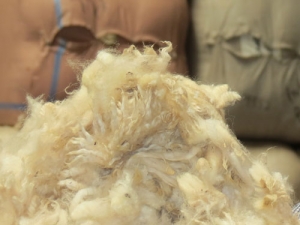Top wool advocate bales out
The conversion of productive farmland into trees has pretty much annihilated the wool industry.
 A combination of factors have given wool cheques a lift and helped to balance sheep farmers' incomes.
A combination of factors have given wool cheques a lift and helped to balance sheep farmers' incomes.
A combination of factors have given wool cheques a lift and helped to balance sheep farmers' incomes, says Kaikoura wool producer and industry representative Derrick Millton.
New Zealand spinning companies, although relatively small users of wool in this country, are flat out at the moment, says Millton, who is chairman of the Wool Research Organisation of NZ (WRONZ).
The lower dollar is also contributing. Either wool demand is increasing, or the supply is reducing, but all those things together "have given farmers' wool cheques quite a lift," he told Rural News.
"That is quite significant. You can put it down to all those things – supply issues, demand issues and people perhaps wanting to use NZ wool because of its superior production or processing capability.
"Hopefully the NZ wool industry is on a better path. Definitely three years ago it was below the level of production and now we are seeing some profits coming to farmers from wool production.
"After they have shorn their sheep there is a reasonable amount left. It's not substantial but that rise has been pretty useful."
He says the clean wool price is now at least $6/kg whereas two years ago it was $4-$4.50.
"Mid micron wool has been a star performer," Millton says. "It has started to really increase in price and compete with Merino. The apparel trade has boosted that." – Pam Tipa
Dairy prices have jumped in the overnight Global Dairy Trade (GDT) auction, breaking a five-month negative streak.
Alliance Group chief executive Willie Wiese is leaving the company after three years in the role.
A booklet produced in 2025 by the Rotoiti 15 trust, Department of Conservation and Scion – now part of the Bioeconomy Science Institute – aims to help people identify insect pests and diseases.
A Taranaki farmer and livestock agent who illegally swapped NAIT tags from cows infected with a bovine disease in an attempt to sell the cows has been fined $15,000.
Bill and Michelle Burgess had an eye-opening realisation when they produced the same with fewer cows.
It was love that first led Leah Prankerd to dairying. Decades later, it's her passion for the industry keeping her there, supporting, and inspiring farmers across the region.

OPINION: The release of the Natural Environment Bill and Planning Bill to replace the Resource Management Act is a red-letter day…
OPINION: Federated Farmers has launched a new campaign, swapping ‘The Twelve Days of Christmas’ for ‘The Twelve Pests of Christmas’ to…